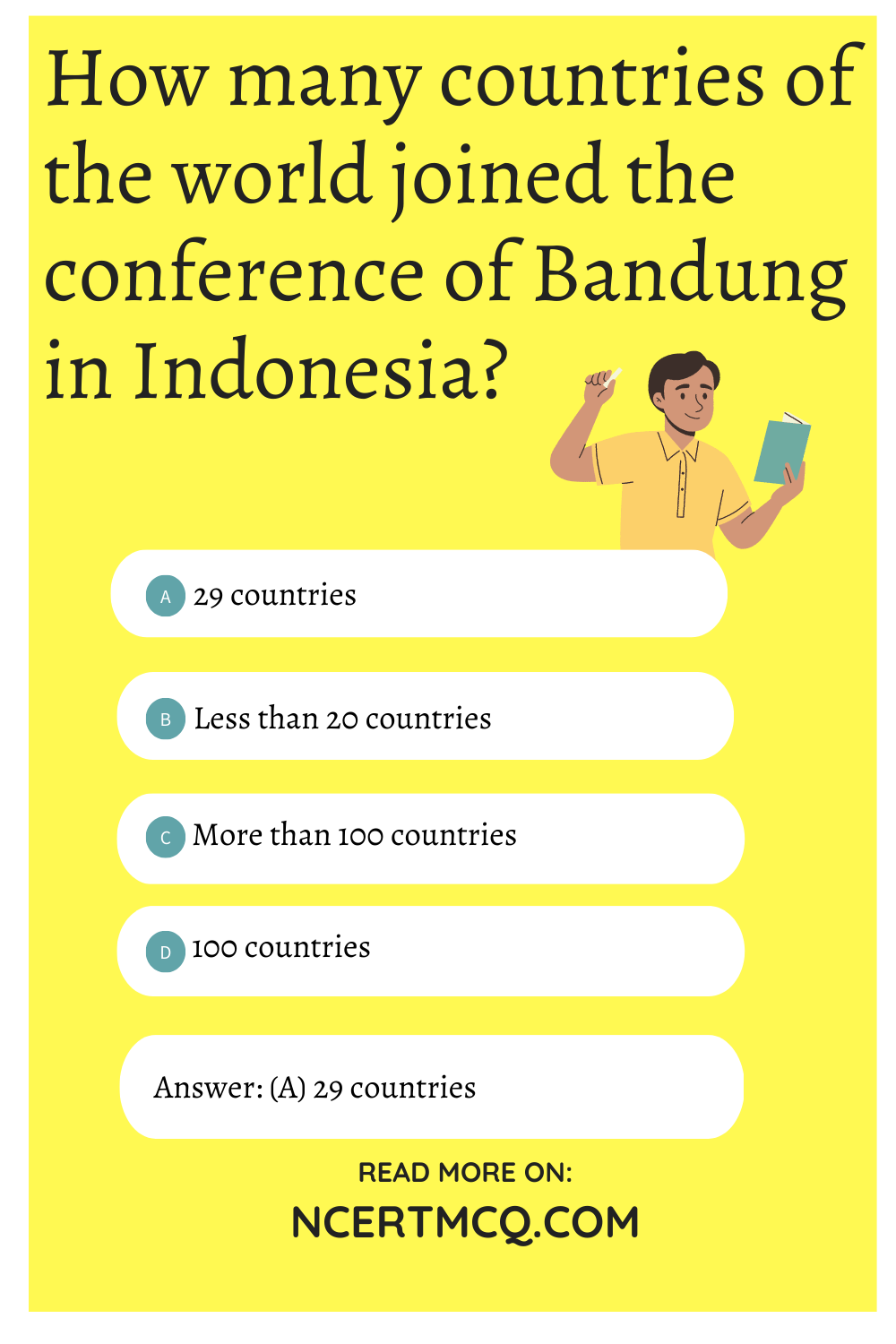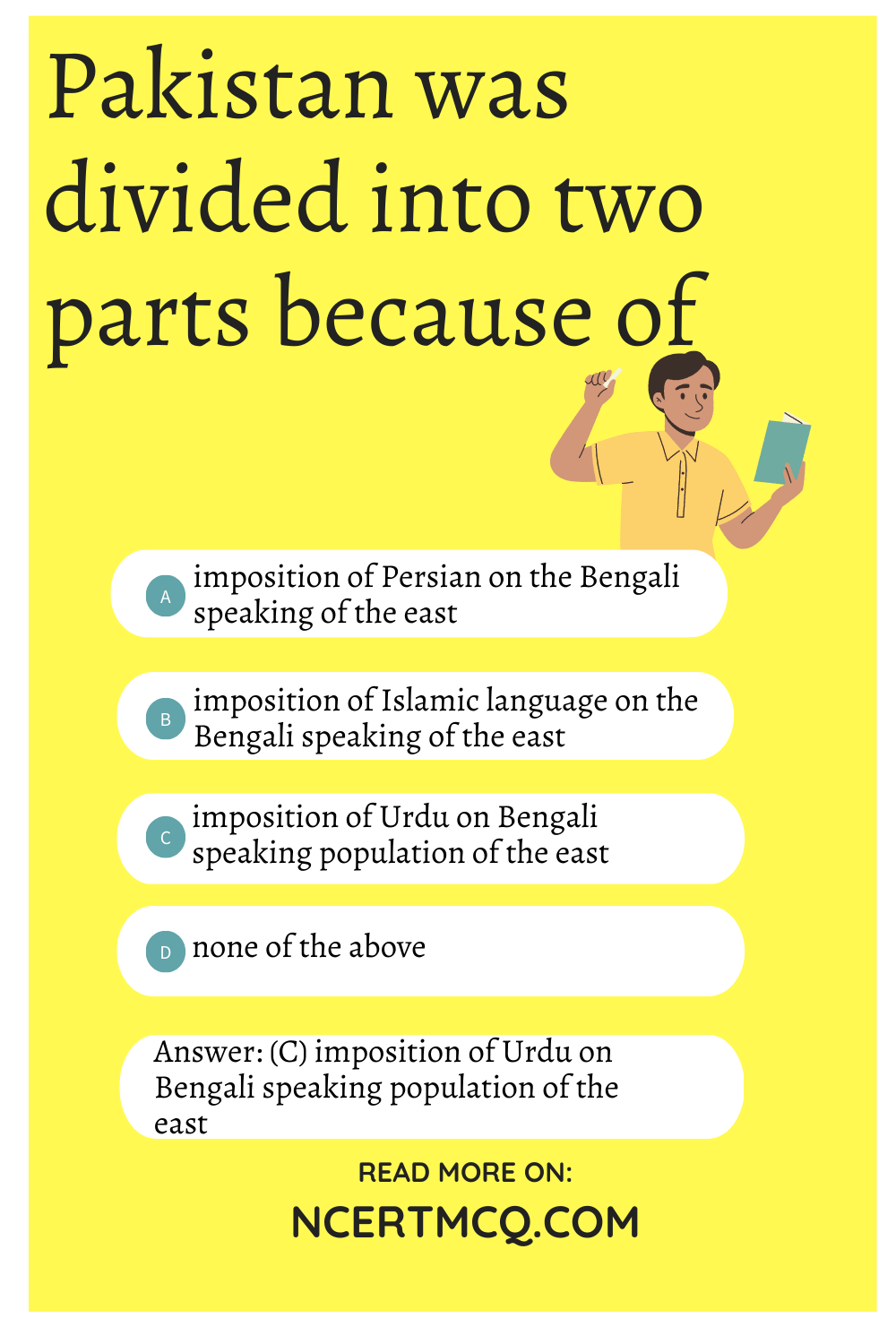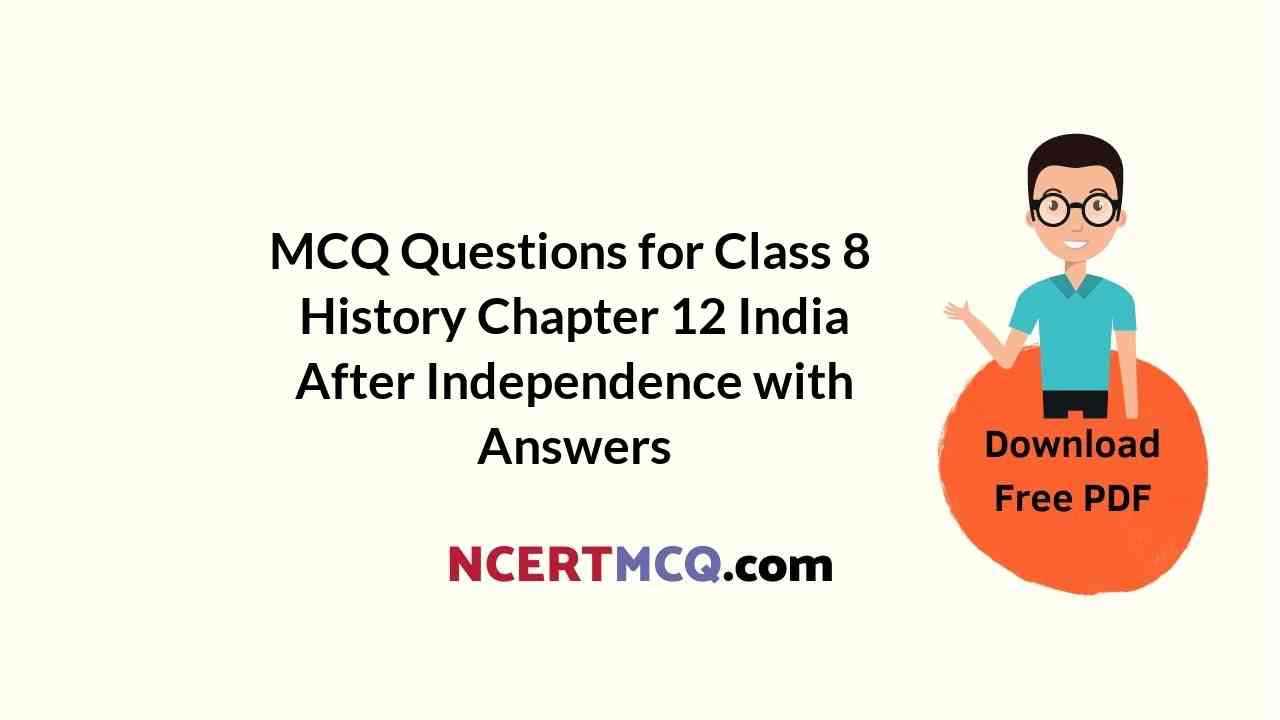Check the below Online Education NCERT MCQ Questions for Class 8 History Chapter 12 India After Independence with Answers Pdf free download. MCQ Questions for Class 8 Social Science with Answers were prepared based on the latest exam pattern. We have Provided India After Independence Class 8 History MCQs Questions with Answers to help students understand the concept very well. https://ncertmcq.com/mcq-questions-for-class-8-social-science-with-answers/
You can refer to NCERT Solutions for Class 8 History Chapter 12 India After Independence to revise the concepts in the syllabus effectively and improve your chances of securing high marks in your board exams.
Class 8 Social Science History Chapter 12 MCQ With Answers
History Class 8 Chapter 12 MCQs On India After Independence
Choose the correct answer:
India After Independence Class 8 MCQ Question 1.
How many countries of the world joined the conference of Bandung in Indonesia?
(a) 29 countries
(b) Less than 20 countries
(c) More than 100 countries
(d) 100 countries
Answer
Answer: (a) 29 countries

India After Independence MCQ Question 2.
Dharavi, the largest slum of the world, is situated in
(a) Calcutta
(b) Chennai
(c) Delhi
(d) Mumbai
Answer
Answer: (d) Mumbai
MCQ For Class 8 History Chapter 12 Question 3.
The leader who went on hunger strike for the Andhra Pradesh to protect the interest of Telugu speakers is
(a) Chitta Ranjan Das
(b) Potti Sriramulu
(c) Krishna Menon
(d) None of these
Answer
Answer: (b) Potti Sriramulu
Class 8 History Chapter 12 MCQ Question 4.
The Bhilai steel plant was set up in the year
(a) 1950
(b) 1952
(c) 1955
(d) 1959
Answer
Answer: (d) 1959
Ncert Class 8 History Chapter 12 MCQ Question 5.
How many Indians formed the Constituent Assembly?
(a) One hundred
(b) Two hundred
(c) Three hundred
(d) Four hundred
Answer
Answer: (c) Three hundred
MCQ On India After Independence Question 6.
New state of Andhra Pradesh came into being
(a) on 1 October, 1953
(b) on 15 October, 1953
(c) on 1 May, 1953
(d) on 15 May, 1953
Answer
Answer: (a) on 1 October, 1953
Class 8 India After Independence MCQ Question 7.
Mukti Vahini was formed by the Bengali Population under the leadership of
(a) Mira Behn
(b) Muziburr Rehman
(c) Potti Sriramulu
(d) None of these
Answer
Answer: (b) Muziburr Rehman
India After Independence Class 8 MCQ With Answers Question 8.
Which is NOT the features of our constitution?
(а) Adoption of Universal Adult Franchise
(b) Preference to Hindu Religion
(c) Equal rights to all citizens
(d) Special privileges for the poorest and most disadvantageous Indians
Answer
Answer: (b) Preference to Hindu Religion
MCQ Questions For Class 8 History Chapter 12 Question 9.
Up to which date were many of the princely states retained as administrative units?
(a) Up to October 15, 1947
(b) Up to October 31, 1947
(c) Up to October 15, 1955
(d) Up to October 31, 1956
Answer
Answer: (d) Up to October 31, 1956
MCQ On India After Independence Class 8 Question 10.
The United Nations was formed in
(a) 1940
(b) 1945
(c) 1947
(d) 1950
Answer
Answer: (b) 1945
Class 8 History India After Independence MCQ Question 11.
India, celebrated its 60th year of independence
(a) on August 15,2007
(b) on August 15, 2009
(c) on january 26,2000
(d) on January 15, 2005
Answer
Answer: (a) on August 15,2007
MCQ Of India After Independence Class 8 Question 12.
Pakistan was divided into two parts because of
(a) imposition of Persian on the Bengali speaking of the east
(b) imposition of Islamic language on the Bengali speaking of the east
(c) imposition of Urdu on Bengali speaking population of the east
(d) none of the above
Answer
Answer: (c) imposition of Urdu on Bengali speaking population of the east

Match the following:
| Column A | Column B |
| (i) Hindu Pakistan | (a) A partition of India on the basis of religion and dominated by Hindus called by Nehru |
| (ii) Gandhian | (b) In which both private and public sectors take part in the production of industries and other spheres |
| (iii) Franchise | (c) The period of power rivalries and ideological conflicts between U.S.A. and U.S.S.R. |
| (iv) Mixed Economy | (d) Not to side any world power |
| (v) Cold War | (e) Followers of Gandhiji’s ideas and actions |
| (vi) Non-alignment | (f) A right to vote |
Answer
Answer:
| Column A | Column B |
| (i) Hindu Pakistan | (a) A partition of India on the basis of religion and dominated by Hindus called by Nehru |
| (ii) Gandhian | (e) Followers of Gandhiji’s ideas and actions |
| (iii) Franchise | (f) A right to vote |
| (iv) Mixed Economy | (b) In which both private and public sectors take part in the production of industries and other spheres |
| (v) Cold War | (c) The period of power rivalries and ideological conflicts between U.S.A. and U.S.S.R. |
| (vi) Non-alignment | (d) Not to side any world power |
State whether true or false:
1. At Independence, the majority of Indians lived in cities.
Answer
Answer: False
2. The Constituent Assembly was made up of members of Muslim League.
Answer
Answer: False
3. In the first national election, only men of age 30 was allowed to vote.
Answer
Answer: False
4. The second Five Year Plan focussed on the development of agriculture.
Answer
Answer: False
5. Dr. B.R. Ambedkar was the Chairman of the Drafting Committee of the Constitution,
Answer
Answer: True
6. The second Five Year Plan was formulated in 1952.
Answer
Answer: False
7. The population of India in 1947 was 38 crore.
Answer
Answer: False
Fill in the blanks:
1. ………………….. assassinated Gandhiji.
Answer
Answer: Nathurain Godse
2. On 26 january 1950 our ………………….. was adopted.
Answer
Answer: Constitution
We hope the given NCERT MCQ Questions for Class 8 History Chapter 12 India After Independence with Answers Pdf free download will help you. If you have any queries regarding India After Independence CBSE Class 8 History MCQs Multiple Choice Questions with Answers, drop a comment below and we will get back to you soon.
Class 8 Social Science History MCQ:
- How, When and Where Class 8 MCQ
- From Trade to Territory Class 8 MCQ
- Ruling the Countryside Class 8 MCQ
- Tribals, Dikus and the Vision of a Golden Age Class 8 MCQ
- When People Rebel 1857 and After Class 8 MCQ
- Colonialism and the City Class 8 MCQ
- Weavers, Iron Smelters and Factory Owners Class 8 MCQ
- Civilising the Native, Educating the Nation Class 8 MCQ
- Women, Caste and Reform Class 8 MCQ
- The Changing World of Visual Arts Class 8 MCQ
- The Making of the National Movement 1870s-1947 Class 8 MCQ
- India After Independence Class 8 MCQ
